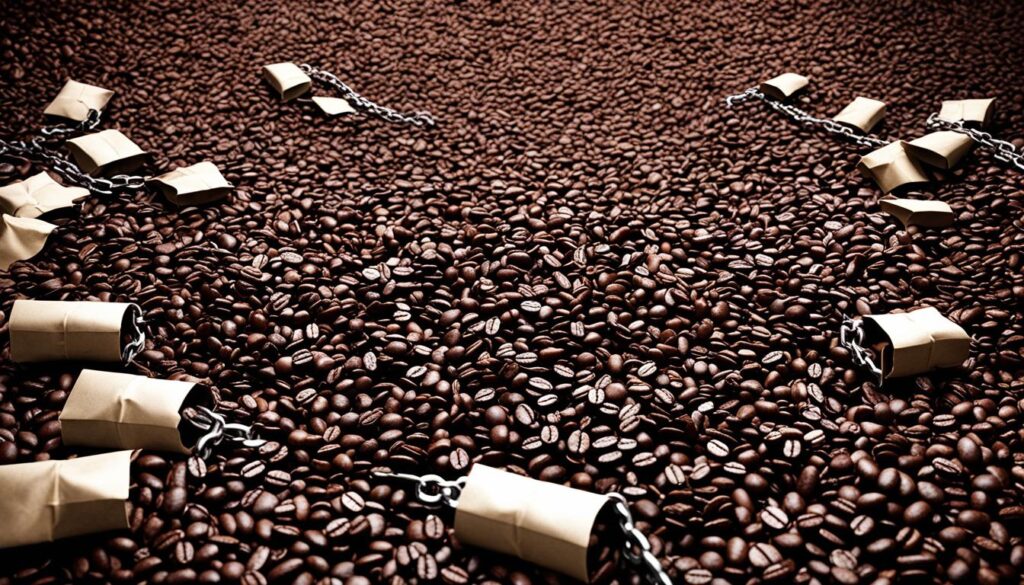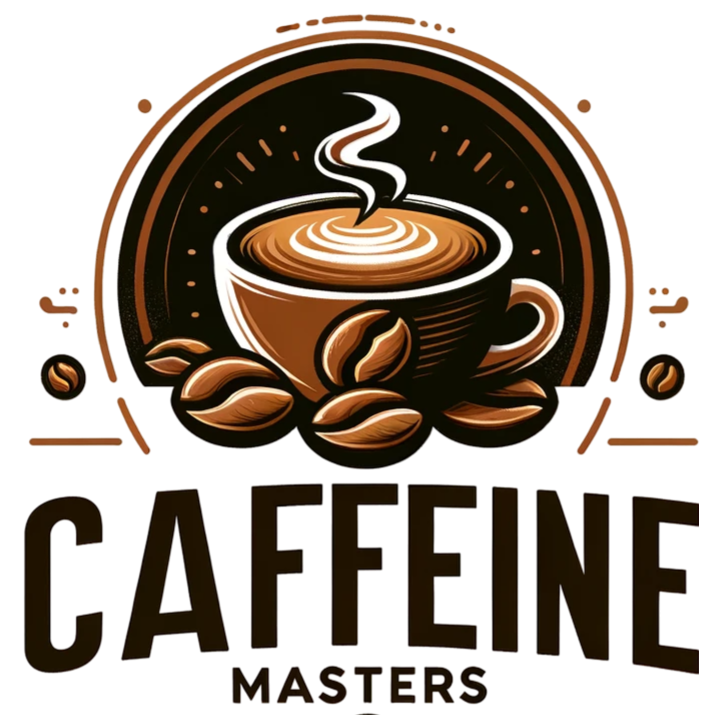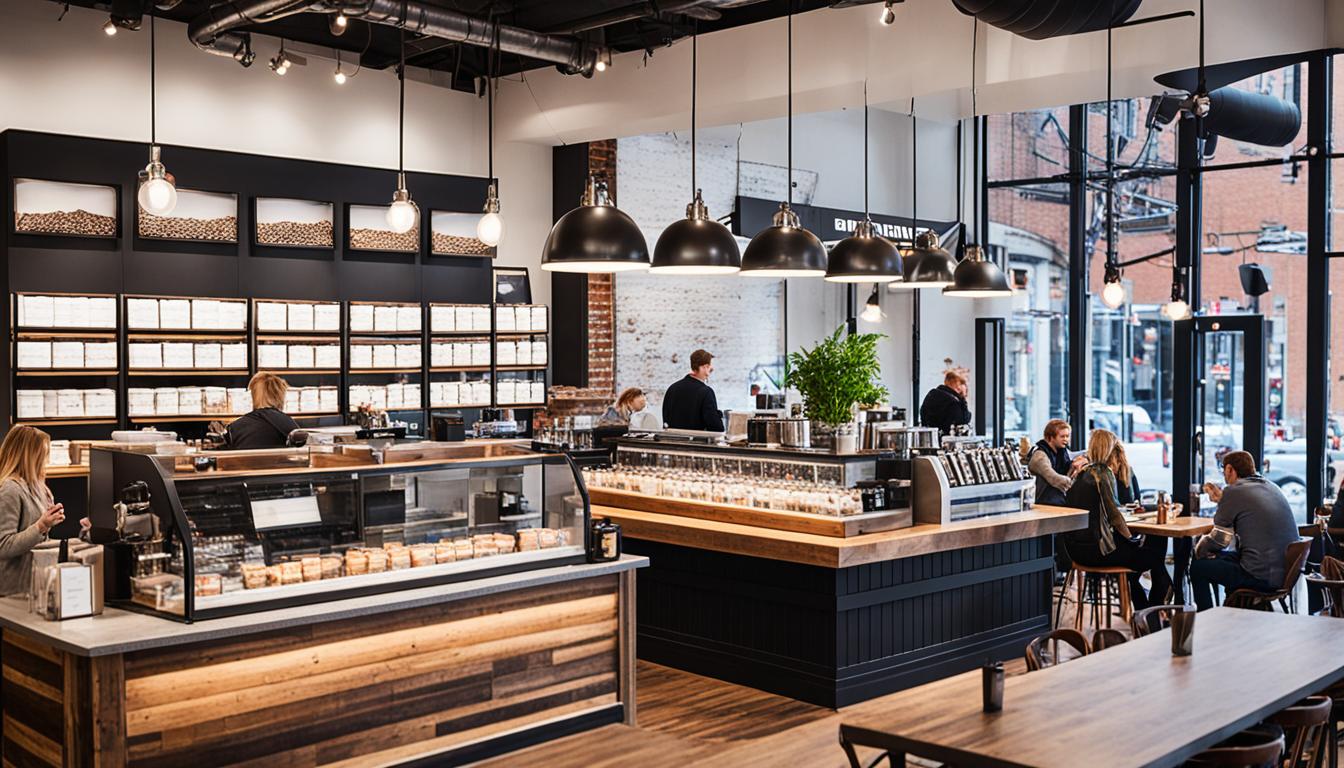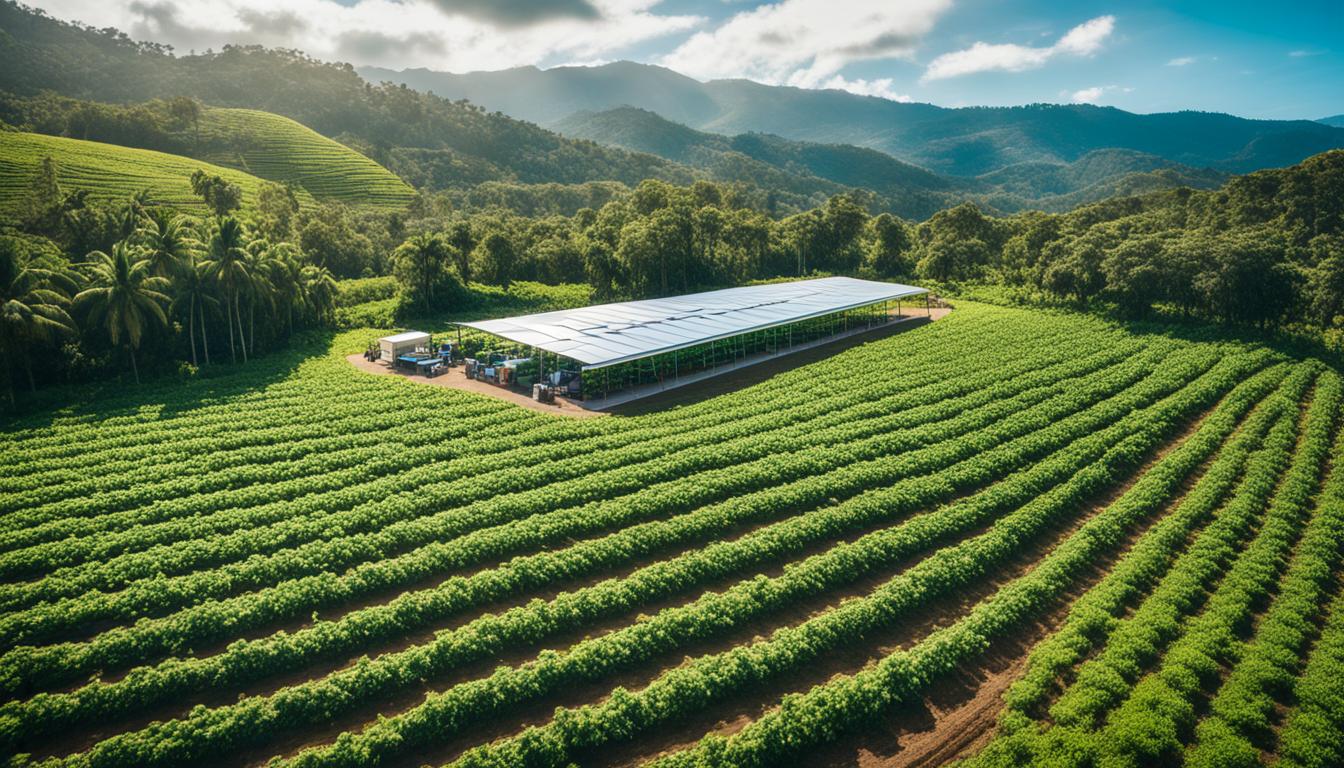Did you know that the specialty coffee market is set to more than double by 2030? With a projected value of $51.4 billion, the industry is experiencing exponential growth and presenting exciting opportunities for coffee shop owners and entrepreneurs.
The demand for specialty coffee is being primarily driven by the younger generation, with Gen Z consumers aged 18-24 accounting for a significant portion of the market. Europe currently leads the way in specialty coffee consumption, but Asia is quickly catching up with its rapid growth.
The expansion of coffee shops is fueling the specialty coffee boom, with cafes and restaurants making up the majority of the market. While the Covid-19 pandemic caused disruptions and challenges, it also highlighted the importance of online sales and delivery services in sustaining the specialty coffee industry.
Key Takeaways:
- The global specialty coffee market is projected to reach $51.4 billion by 2030.
- Gen Z consumers aged 18-24 are driving the demand for specialty coffee.
- Europe is currently the largest market for specialty coffee, but Asia is experiencing rapid growth.
- The expansion of coffee shops is leading the way in the specialty coffee industry.
- Online sales and delivery services have helped mitigate the impact of the pandemic on specialty coffee retailers.
Factors Driving Specialty Coffee Retail Expansion
The increasing demand for specialty coffee can be attributed to various factors. Consumers desire high-quality and flavorful coffee experiences, as well as increased awareness of ethical and sustainable sourcing practices. Coffee culture continues to thrive, with specialty coffee shops and cafes serving as popular social destinations. Health-conscious individuals are drawn to specialty coffee for its use of higher quality beans and refined roasting processes. Social media has also played a role in amplifying interest in specialty coffee by showcasing new products and trends.
“Specialty coffee provides an elevated coffee experience with a focus on quality, sustainability, and uniqueness. It resonates with consumers who appreciate the art and craftsmanship that goes into brewing a perfect cup of coffee,” said Jane Thompson, owner of Beans & Brews, a boutique coffee store in New York City.
Source: Social Media Influence
Social media platforms have significantly contributed to the growth of the specialty coffee market. Cafes and specialty coffee shops utilize platforms like Instagram, TikTok, and YouTube to showcase their offerings and engage with a wider audience. The visually appealing photos and videos of latte art, pour-over techniques, and unique coffee creations entice coffee enthusiasts to visit these establishments. The viral nature of social media trends can quickly turn a boutique coffee store into a must-visit destination.
Health Consciousness and Flavor Expectations
As consumers become more health-conscious, there is an increasing demand for specialty coffee that aligns with their preferences and values. Specialty coffee often uses organic, fair-trade, and sustainably sourced beans, ensuring that consumers can enjoy their cup of joe ethically. Additionally, the refined roasting processes in specialty coffee highlight the unique flavors and profiles of different coffee beans. This, in turn, satisfies the consumer’s desire for a rich and flavorful coffee experience.
The Rise of Coffee Culture
Coffee culture has evolved over the years, with specialty coffee shops and cafes becoming integral parts of people’s daily lives. These establishments aren’t just places to grab a cup of coffee; they have transformed into social hubs where individuals can gather, work, and connect with others. The sense of community and the cozy atmosphere offered by boutique coffee stores enhance the overall coffee-drinking experience, further driving the demand for specialty coffee.
Specialty Coffee Market Growth by Region
| Region | Market Share | Growth Rate |
|---|---|---|
| North America | 35% | 10.5% |
| Europe | 40% | 9.8% |
| Asia-Pacific | 20% | 14.2% |
| Latin America | 5% | 8.3% |
Source: Global Coffee Association
The specialty coffee market is experiencing significant growth on a global scale. North America, Europe, and Asia-Pacific are key regions driving this expansion. The emphasis on specialty coffee in these regions, coupled with a growing consumer base and increasing disposable income, has propelled the market forward.
In conclusion, boutique coffee store development and premium coffee store expansion are driven by factors such as consumer preferences for high-quality, flavorful coffee, the influence of social media, the rise of coffee culture, and health-consciousness. The specialty coffee market continues to grow, attracting coffee enthusiasts who seek unique and ethically sourced coffee experiences.
Impact of Covid-19 on Specialty Coffee Retail Expansion
The Covid-19 pandemic had a significant impact on the gourmet coffee retailer expansion and the entire specialty coffee industry. The closure of cafes and restaurants during lockdowns resulted in a significant decline in foodservice sales, severely affecting the revenue of many specialty coffee businesses. However, despite these challenges, the industry witnessed a remarkable adaptation and resilience.
As the work-from-home trend became the new norm, coffee enthusiasts found solace in brewing their favorite gourmet coffee at home. This shift in consumer behavior drove a surge in demand for online coffee sales and delivery services. To meet this growing need, gourmet coffee retailers swiftly adapted their business models, embracing e-commerce platforms to reach their customers right at their doorstep.
The global coffee bean supply chain faced unprecedented disruptions due to the pandemic. Restrictions on international travel, lockdowns, and labor shortages led to logistical challenges in sourcing and transporting coffee beans from the farms to the roasters and retailers. These disruptions in the supply chain had a direct impact on the availability and pricing of specialty coffee.

The gourmet coffee retailer expansion was further hindered by higher prices for specialty coffee as a result of the disrupted supply chain. The increased costs impacted both businesses and consumers, making gourmet coffee less affordable for some and affecting the profit margins of retailers. Regions heavily reliant on coffee imports experienced potential shortages of specialty coffee as exporters struggled to meet the demand.
Despite these challenges, the specialty coffee industry demonstrated its resilience and adaptability. Gourmet coffee retailers quickly embraced online platforms, allowing them to continue serving their loyal customers. The pandemic highlighted the importance of diversifying distribution channels and strengthening relationships within the coffee bean supply chain to ensure future stability and growth.
The Covid-19 pandemic has presented numerous challenges for the specialty coffee industry, but it has also served as a catalyst for innovation and adaptation. Gourmet coffee retailers have shown incredible resilience, exploring new avenues to engage with their customers and ensuring that the exquisite taste and experience of specialty coffee continues to enthrall coffee enthusiasts around the world.
Market Segmentation and Consumer Insights
In the dynamic specialty coffee market, understanding consumer preferences and effective market segmentation is crucial for high-end coffee shop expansion. By identifying key factors that influence coffee consumer choices, businesses can tailor their offerings to meet the demands of their target market.
One of the primary factors influencing consumer preferences is the type of coffee beans used. Coffee enthusiasts recognize the distinct flavors and characteristics of different beans, such as the renowned Arabica, the robust Robusta, or unique blends. Each variety offers a unique taste experience that appeals to different segments of the market.
The way coffee beans are processed also greatly impacts flavor profiles. Whether it’s the traditional washed method, the natural process, or the intriguing honey-processed technique, every approach contributes to the coffee’s distinctive taste and aroma. As a result, consumers with varying flavor preferences seek out specific processing methods.
Certifications and origins are also important considerations for coffee consumers. Different certifications, like Fair Trade, Organic, and Rainforest Alliance, indicate ethical and sustainable practices in the coffee industry. Conscious consumers are increasingly opting for coffee that aligns with their values, choosing products with these certifications. Additionally, the origin of the coffee, such as beans sourced from specific regions or farms, can enhance the experience and appeal to consumers looking for unique flavor profiles tied to specific locations.
The roast level of the coffee is yet another factor that shapes consumer preferences. Ranging from light to dark, each roast level imparts different flavors and caffeine content to the final cup. Lighter roasts tend to have brighter and more complex flavors, while darker roasts offer a bolder and smokier taste. Coffee enthusiasts select roast levels based on their desired flavor intensity and personal preferences.
To reach the diverse consumer base, specialty coffee is distributed through various channels. While specialty coffee shops and cafes remain popular destinations for enthusiasts searching for a curated experience, online platforms and supermarkets provide convenient options for those seeking specialty coffee in their own homes. Online distribution channels, in particular, have experienced substantial growth, enabling coffee businesses to expand their reach and connect with customers worldwide.
The specialty coffee market attracts a wide range of age groups, with the 18-24 age category dominating the consumer base. This younger demographic values unique and high-quality coffee experiences, embracing the specialty coffee culture. Following closely behind, the 25-39 age group also contributes significantly to the market’s growth.
Commercial businesses, including coffee shops and restaurants, play a vital role in driving the demand for specialty coffee. These establishments seek to offer exceptional coffee experiences to their customers, often partnering with specialty coffee suppliers to provide premium offerings and keep up with evolving consumer preferences.
Finally, convenience stores and online distribution channels significantly contribute to making specialty coffee more accessible. These platforms cater to consumers seeking convenience and a quick coffee fix, exposing a broader audience to the world of specialty coffee.
As the specialty coffee market continues to thrive, understanding consumer preferences and effective market segmentation will be crucial for high-end coffee shop expansion. By aligning their offerings with consumer demands, businesses can create a personalized and immersive coffee experience, capturing the hearts and taste buds of coffee enthusiasts worldwide.
Conclusion
The specialty coffee market is currently undergoing a period of rapid growth and expansion. This can be attributed to the increasing demand for unique and high-quality coffee experiences among consumers. People are no longer satisfied with ordinary, mass-produced coffee; they seek out specialty coffee that offers a truly exceptional taste and aroma.
Additionally, there is a growing focus on sustainability and ethical sourcing practices within the specialty coffee industry. Consumers are becoming more conscious of the environmental and social impact of their purchasing decisions. As a result, they are actively seeking out coffee brands that prioritize sustainable farming methods and fair trade practices.
The Covid-19 pandemic presented challenges for the specialty coffee market, but it also ushered in new opportunities. With the closure of coffee shops and restaurants, online sales and home consumption of specialty coffee saw a significant rise. This shift in consumer behavior has prompted coffee roasters and retailers to adapt and embrace e-commerce platforms as a means of reaching their customers.
As the specialty coffee industry continues to evolve, there is a strong emphasis on innovative brewing methods and unique flavor profiles. Coffee enthusiasts are constantly on the lookout for new and exciting ways to enjoy their favorite beverage. From pour-over methods to cold brew techniques, the specialty coffee market offers a multitude of options to cater to every individual’s taste preferences.
Looking ahead, the future of the specialty coffee market appears bright. With its continued growth and dedication to providing a personalized and immersive coffee experience, the specialty coffee industry is poised to thrive. Coffee lovers can expect to indulge in extraordinary flavors, sustainably sourced beans, and innovative brewing methods for years to come.
FAQ
What is the forecasted growth for the specialty coffee market?
The global market for specialty coffee is forecasted to more than double by 2030, reaching .4 billion with a compound annual growth rate of 11.3%.
What age group dominates the specialty coffee market?
The age group between 18-24 dominates the specialty coffee market, followed by the age group between 25-39.
What factors are driving specialty coffee retail expansion?
Factors driving specialty coffee retail expansion include boutique coffee store development, premium coffee store expansion, and the overall growth of the specialty coffee market.
How did the Covid-19 pandemic impact the specialty coffee industry?
The closure of cafes and restaurants led to a decline in foodservice sales, but the work-from-home trend drove demand for online coffee sales and delivery services. Disruptions in the global coffee supply chain resulted in higher prices for specialty coffee and potential shortages in some regions.
How is the specialty coffee market segmented?
The specialty coffee market is segmented based on coffee bean types, processing methods, certifications and origins, roast level, and distribution channels.




